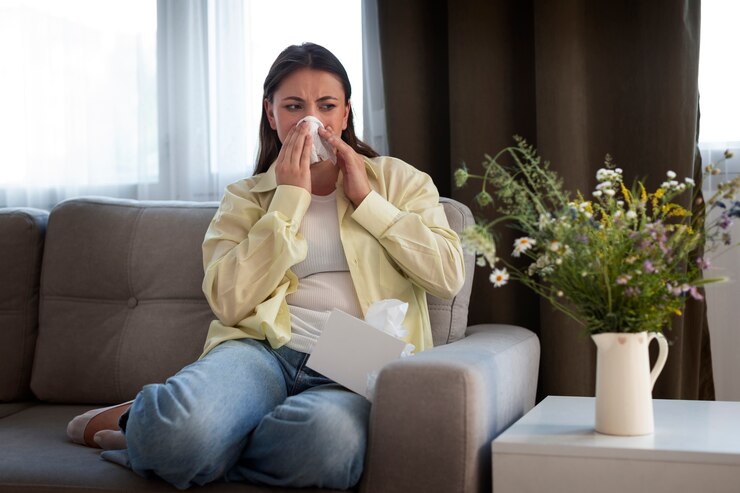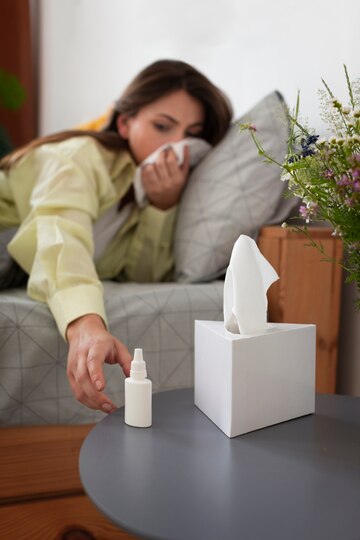Allergy Relief: Expert Tips, Home Remedies, and Medical Treatments
Allergies are one of the most common chronic conditions in the world, impacting millions no matter their age or background. These happen when the immune system responds to substances which would normally be harmless most people, with pollen, dust mites and spores we breathe in on a daily basis or common foods. These are substances and materials, called allergens that when consumed by the body create a range of responses from annoying to life-threatening.
This article will give you a deep dive into allergies with their causes, symptoms and different routes to treatment including home remedies as well modern medical approaches.
What Are Allergies?
When our immune system gets confused and thinks that a harmless substance is trying to harm the body the end result can be allergies. The immune system triggers the production of antibodies known as Immunoglobulin E IgE when an allergen is introduced into our bodies. These antibodies then go to cells that release substances, such as histamine when the body has an allergic response.

Common Allergens
Pollen- This is also a common allergen, pollens are released from trees grasses and weeds (this causes hay fever)
DUST MITES: They’re microscopic critters that build homes in household dust and love the warm, humid quarters of your house.
Animal Dander: The proteins found in the skin cells, urine and saliva of pets can cause allergies.
Mold- Mold spores are released in the air and can lead to allergies mainly when there is moisture.
Food allergens: They are the ingredients like nuts, Shellfishes, eggs and dairy etc.
Insect Bites: Bees, wasps and other stinging insects eventually cause severe allergic reaction to venom in few people.
Drugs: People may be allergic to some medications such as penicillin.
Latex: Gloves and other products may cause an allergy due to the proteins present in latex
Symptoms of Allergies
Symptoms of allergies can be entirely different based on the person and allergen. Common symptoms include:
- Sneezing
- Runny or Stuffy Nose
- Itchy, Watery Eyes
- Coughing
- Rashes or Hives
- Shortness of Breath
- Swelling
- Hypersensitivity and Anaphylaxis
Anaphylaxis — An emergency condition which needs urgent care. Anaphylaxis, which can result in difficulty breathing, a sudden and rapid drop in blood pressure and unconsciousness.
Diagnosing Allergies
If you think that you may have allergies, please consult a health professional to give your environmental sensitivity more legitimate standing. Some common ways to diagnosis allergies include:
Skin Prick Test: A trace amount of the allergen in question is put on your skin and then a needle pricks through it to allow just enough of that substance inwaters intolayersMG. You will develop a raised bump at the site of your test if you are allergic.
Remember to have a blood test: The IgE antibodies of an individual are typically measured responding to particular allergens [8].
Elimination Diet- used to rule out food allergies Individuals are instructed to avoid foods that they suspect may be causing them problems — and then the typically eliminated food is added back into their diet for observation.
Home Remedies for Allergies
There is definitely a time for prescriptions if you have severe enough allergies — but there are also plenty of home remedies available to relieve mild or moderate symptoms. These fixes centre around less full specialty of allergens and quieting the side effects.
1. Saline Nasal Rinse
Rinse with saline A saline nasal rinse clears pollen, dust and other allergens from your nasal passages to relieve symptoms of congestion and inflammation. You may need to use a neti pot or saline spray.
How to Use:
Combine 1/4 to 1/2 teaspoon non-iodized salt and a pinch of baking soda in eight ounces distilled or boiled water.
Enter the solution into one nostril using a neti pot or squeeze bottle, then let it flow from other side.
Repeat on the other side.
2. Honey
Eating local honey can boost your immunity to pollen in the area where you live and thus reduce seasonal allergies. Research needs to be done but the initial concept has come into existence.
How to Use:
One teaspoon of raw, local honey daily [ ], beginning ideally at least a few months prior to the typical pollen season.
3. Quercetin
Quercetin is a flavonoid found in apples, onions and berries. It is anti-inflammatory and an antihistamine, which will result in decreased allergy reactions.
How to Use:
Quercetin: Eat foods that contain quercetin help to reduce the number of other antioxidants consumed, since they are thought as synergizes; sources include apples, onions kale. and berries
Quercetin supplements are likewise obtainable, but speak with a medical professional prior to taking any brand-new supplement.
4. Probiotics
A healthy gut microbiome is a cornerstone for an effective immune system. Healthy bacteria such as probiotics can equalise the balance of gut flora and thus, minimising allergic reactions.
How to Use:
Eat foods that are high in probiotics such as yogurt, kefir, sauerkraut (pickled cabbage), and kimchi finesse.
Take a probiotic- great seasonal support during allergy season!
5. Petasites hybridus (butterbur)
Butterbur is a plant that has been seen to improve hayfever symptoms. It prevents the release of leukotrienes, which are substances in the body that cause inflammation and allergic symptoms.
How to Use:
Butterbur Supplements Butterbu is available in supplemental capsule form. Opt for a PA-free product to ensure it does not contain any dangerous alkaloids.
Do consult with a healthcare provider before starting butterbur, particularly if you are already taking other medications.
6. Vitamin C
Vitamin C is a natural antihistamine, which can help in managing the symptoms associate with hypersensitivity reactions by inhibiting histamines generation from ferrous ion treatment of mast cells.
How to Use:
Eat more broccoli, bell peppers, strawberries or oranges to get a boost of vitamin C.
Vitamin C supplements can also help, but a physician will provide you with appropriate dosage of the vitamin.
7. Eucalyptus Oil
The anti-inflammatory actions of eucalyptus oil can help reduce symptoms, including asthma and sinusitis related to allergens.
How to Use:
Use ➜➥ Boil a bowl of hot water, add some drops of eucalyptus oil in it and inhale the steam (It will help to clear nasal passages).
Eucalyptus oil may be mixed to water for steam inhalation, placed into a diffuser or poured in warm bathrieved.
How to Deal with Seasonal Allergies in Your Lifestyle
Along with home remedies, there are some lifestyle changes which can be beneficial in controlling and reducing the severity of allergy symptoms.
1. Reduce Exposure to Allergens
Avoiding exposure to allergens is your best way of preventing allergic reactions.
Pollen: close windows in your house and use air conditioning, wear a mask when you have to be outdoors (e.g., gardening), stay indoors as much as possible果 least when pollen levels are at peak times.
Dust Mites: Cut down use of bedding, pillows/mattresses with allergen-proof covers (wash every week using hot water), keep humidity in home at a low.
Pet Dander: Exclude pets from your bedroom and furnishings, wash them regularly and hoover with a vacuum cleaner containing HEPA Filter.
Mold: Locate and fix leaks in your house, use a dehumidifier for humid areas, clean moldy surfaces with water & vinegar solution.
2. Maintain a Clean Environment
Frequent cleaning can positively affect the amount of allergens inside your home.
Vacuuming: Employ a vacuum cleaner that has a HEPA filter to clean dirt, pollen as well pet dander from the carpet and upholstery.
Dust: Dust with a damp cloth to keep polluted particles from floating throughout the house.
Air Filtering: Think about utilizing a HEPA air purifier to eliminate the allergens from the atmosphere.
3. Stay Hydrated
Staying well hydrated helps to thin your mucus, and this can help make it easier for you clear out of sinuses. Besides watering it down, hydration gives the body running water to help flush out allergens and toxins.
4. Dietary Adjustments
Depending on what we eat, the foods can cause more or less of an allergic reaction. Combine an anti-inflammatory food plan and lower the inflammatory foods, which will benefit those who have more severe allergic sensitivities.
Limit: Dairy, processed foods and snacks (doughnuts; pastries), as well as high sugar or trans fatty acid content in your food can lead to inflammation.
Examples include Omega-3 fatty acids (fish, flaxseeds and walnuts), fruits and vegetables which are high in antioxidants, herbal teas with anti-inflammatory properties such as ginger or turmeric/saffron.
5. Exercise Regularly
Additionally, regular exercise can lead to the stimulation of immune defenses and help your body resist allergens. But, if you have allergies to grass or tree pollens — peak seasons for outdoor pollen are key times to move exercise indoors.

